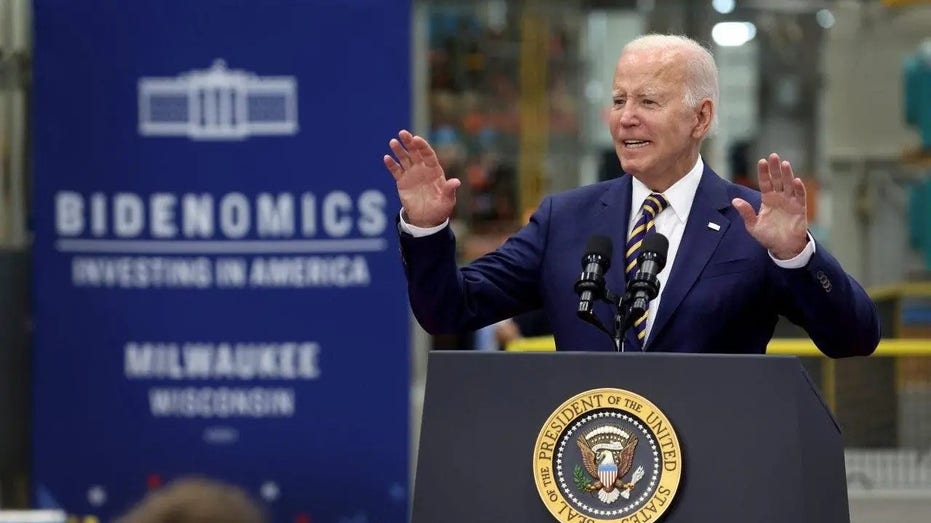Coalition calls on Congress to repeal Biden's prescription drug price controls
Inflation Reduction Act's drug price caps put US 'one step closer to socialized medicine,' groups say
GOP rep on Biden's war on pharma industry: Everything Biden touches turns into a crisis
Republican Missouri Rep. Jason Smith discusses the reconciliation bill's effects on the pharmaceutical industry on "Kudlow."
EXCLUSIVE — A coalition of more than 40 groups is calling on Congress to repeal the Drug Price Negotiation Program included in the Inflation Reduction Act (IRA) that passed last year, arguing that the price control scheme run by the Biden administration will ultimately lead to shortages of medicines and higher costs.
In a letter obtained by FOX Business that will be sent to federal lawmakers Tuesday morning, the organizations urge legislators to repeal the Medicare price negotiation program run by the Department of Health and Human Services, "given the well-documented destructive history of price controls and the law’s expansion of government power over our health-care system."

Medicare was given the authority to set lower prices on selected, covered high-expenditure drugs under the Inflation Reduction Act. (Mike Mergen / Bloomberg / File / Getty Images)
The signatories, led by free-market think tank Competitive Enterprise Institute (CEI), include leaders from several libertarian and conservative-leaning groups, including Americans for Prosperity, Americans for Tax Reform, and Tea Party Patriots Action.
"Permeating this whole portion of the IRA is the flawed notion that price controls are a good thing for consumers and patients," the letter reads. "Time and time again, price controls have been shown to suppress innovation by distorting and interfering with supply and demand and other forces that make markets and capitalism work."
RENT CONTROL LAWS COULD BE CONTRIBUTING TO SHORTAGE OF AFFORDABLE HOUSING
The IRA, which was largely a social spending, tax and climate change bill, was passed by congressional Democrats and signed into law by President Biden in August 2022. Not a single Republican in the House or Senate voted in favor of the legislation.

President Biden speaks in Milwaukee on Aug. 15, 2023. Biden used the opportunity to speak about his "Bidenomics" economic plan on the one-year anniversary of the Inflation Reduction Act of 2022. (Ingeteam Inc. / Getty Images)
Under the law, Centers for Medicare & Medicaid Services (CMS) was given the authority to set lower prices on certain prescription drugs. While the IRA refers to "negotiation," the text of the legislation allows the CMS to set a "maximum fair price" for a drug. The pharmaceutical company then must "enter into agreement" for the price. If they do not, the government will assess a daily excise tax on every drug sold over the "maximum fair price."
CONSUMER GROUP EXPOSES COSTS OF BIDEN ADMIN'S WAR ON HOME APPLIANCES
The Biden administration named the first 10 drugs subject to government price-setting under CMS two months ago. Those price caps will not go into effect until 2026.
CMS Administrator Chiquita Brooks-LaSure has touted the program as a way "to improve access to some of the costliest drugs for millions of people with Medicare while driving competition and innovation." Over the next four years, Medicare will work to set prices for up to 60 drugs under the program and up to another 20 drugs each year after that, according to the administration.
| Ticker | Security | Last | Change | Change % |
|---|---|---|---|---|
| BMY | BRISTOL MYERS SQUIBB CO. | 60.74 | -1.20 | -1.94% |
| JNJ | JOHNSON & JOHNSON | 238.64 | -1.35 | -0.56% |
| MRK | MERCK & CO. INC. | 117.57 | -4.31 | -3.54% |
The U.S. Chamber of Commerce and several drugmakers, including Bristol Myers Squibb, Johnson & Johnson and Merck, have sued the federal government over the price "negotiation" program. Merck referred to the program as a "sham."
It's been reported in the past that CEI has received donations from various individual donors, foundations and corporations, including Google, Comcast and Ford. As a 501(c)3 organization, they are not required to disclose specific donor information.
The Washington Post reported a decade ago that CEI received donations from Pharmaceutical Research and Manufacturers of America (PhRMA), the pharmaceutical industry's largest lobbying group. PhRMA is also currently suing the Biden administration over the new drug price controls.
GET FOX BUSINESS ON THE GO BY CLICKING HERE
"Health care provisions in the Inflation Reduction Act have put America one step closer to socialized medicine," the CEI-led letter to Congress reads. "If left in place, these provisions will make the American economy less competitive and leave America sicker."
FOX Business' Daniella Genovese contributed to this report.





















